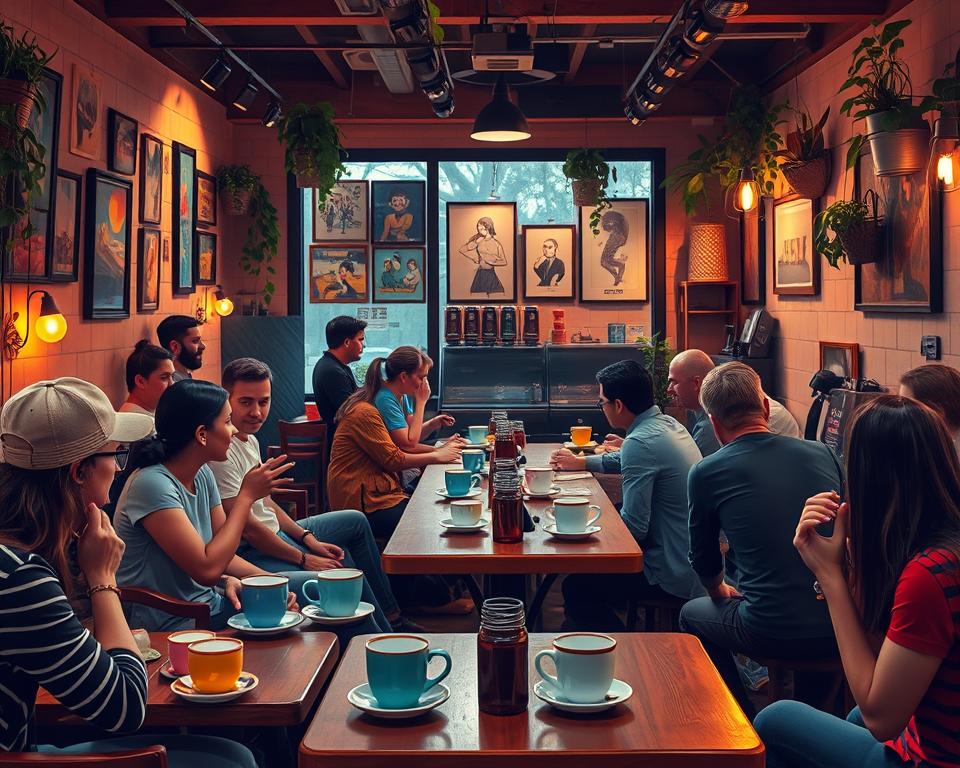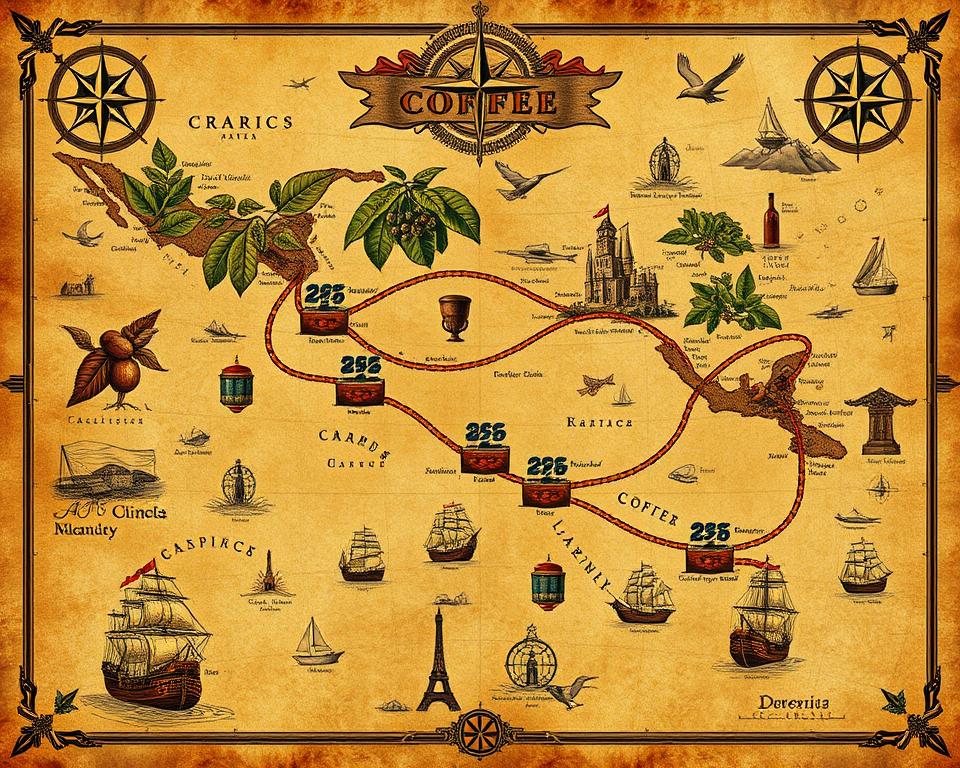The story of coffee is truly fascinating. It began in the Ethiopian Highlands. By the 15th century, Sufi monasteries in Yemen were using it. They used coffee to stay awake and focused during prayers. The discovery of coffee spread to Mecca and then across the Islamic world.
Early on, coffee caused some religious debates. In 1511, Mecca banned coffee, but Ottoman Sultan Suleiman I reversed this in 1524. By the 16th century, coffee had reached Europe via Venice, Italy. The first coffee house opened in Constantinople in the mid-15th century.
Coffee houses became places where people shared ideas. They were crucial during the Enlightenment Period for spreading knowledge.
Coffee continued to spread around the globe. By 1852, Brazil was the top coffee producer. However, coffee’s ancient roots are in Ethiopia and Yemen. Studies show that Coffea arabica comes from Ethiopia’s Harar region.
The history of coffee covers many cultures and continents. It moved from being a religious aid to a social staple. Today, coffee is one of the most loved drinks worldwide. Its long history and global appeal show its lasting legacy.
Origins of Coffee: The Legend of Kaldi and the Ethiopian Highlands
The story of coffee begins with wonderful tales and traditions. One popular story from Ethiopian coffee lore is about Kaldi. He was an observant goat herder who discovered coffee’s energizing effects.
The Legend of Kaldi and the Dancing Goats
The tale says that in the 9th century, in the Ethiopian highlands, Kaldi noticed his goats were extra lively. They had eaten red berries from a certain tree. Wanting to feel the same burst of energy, Kaldi tried the berries. His discovery quickly influenced Ethiopian coffee history.

Early Use of Coffee in Ethiopian Tribes
After Kaldi found the berries, coffee became crucial for Ethiopian tribes. It was not just for energy but also for bringing people together. The Ethiopian coffee ceremony, emphasizing hospitality and friendship, remains important in their culture.
Introduction to Yemen and the Arabian Peninsula
By the 15th century, coffee reached Yemen across the Red Sea. There, Sufi monks used coffee to stay awake for prayers. They loved its stimulating properties. Soon, coffee became a key part of culture and society in the Middle East.
Coffee in Ancient Islamic Culture
The journey of coffee through ancient Islamic culture is a tale full of discovery and tradition. Early use of coffee was deeply tied to religious celebrations and for healing. The Oromo people of Ethiopia used coffee as a drink, medicine, and in their rituals. The importance of coffee rituals was big in these communities.
The Role of Sufi Monasteries
Sufi monasteries played a key role in making coffee a part of Islamic tradition. The Sufis used coffee in their religious events to stay alert during their prayers and chanting. This shows how important coffee became in Sufi rituals. Islamic doctors between the 9th and 11th centuries also praised coffee’s health benefits.
Dawud Al-Antaki, a famous Islamic doctor in the 16th century, said coffee could help with many illnesses. This included coughs and various diseases.

Coffeehouses in cities like Mecca and Cairo boosted the spread of coffee. They were not just places to drink coffee. They were the heart of discussions, poetry, music, and more, adding to the culture of the time. This era was a high point for the role of coffee in Islamic society.
But the energizing effects of coffee raised concerns among some religious leaders in the 16th century. They compared coffee to hashish and alcohol, sparking debates on its use. Yet, coffee kept its place in Islamic social and religious life. The port of Mocha in Yemen emerged as a key spot for coffee trade in the 15th century.
This made coffee an essential part of the region’s culture. Coffee’s path through ancient Islamic culture shows its big effect on religion and society.
The Spread of Coffee Across Ancient Civilizations
Coffee’s rise in popularity shows it moving from sacred origins to a daily necessity, mingling with the cultures of ancient civilizations. Its journey not only shows its ability to adapt but also its impact on society and politics.
Introduction to Mecca and Religious Controversies
When coffee reached Mecca in 1414, it sparked both interest and backlash. It became a key part of daily life for many, despite initial resistance. Religious leaders, wary of its effects, sometimes banned it.
Yet, coffee’s energizing qualities won over skeptics, integrating it into Mecca’s spiritual and communal life.
Expansion to Cairo and Coffeehouses
Coffee then flowed to Cairo, gaining a warm welcome. The emergence of Cairo’s coffeehouses signaled a cultural transformation. These spots were hubs for thinkers and creatives to gather and share ideas.
Their existence enriched Cairo’s social and cultural landscape, showing coffee’s role in fostering community and dialogue.
The Ottoman Empire and European Introduction
Coffee’s journey continued into the Ottoman Empire, becoming key in Ottoman society. Coffeehouses or “qahveh khaneh” were vital for social and political discussions. They were crucial in cities like Istanbul.
As the Ottoman’s reach stretched to Europe, coffee followed. Venice opened its first coffeehouse in 1683. By 1700, London had over 3,000 coffeehouses. Europe’s initial curiosity turned into fondness, helping shape the Enlightenment.
Coffee in Ancient Civilizations
In different cultures, coffee held various roles, becoming a key part of our coffee heritage. In Ethiopia, it was central to the Oromo tribe’s religious ceremonies. It similarly connected to spirituality in Yemen, where Sufis used it in their rituals. This helped coffee gain wider acceptance in the Arabian Peninsula.
In the 15th and 16th centuries, the Ottoman Empire saw the rise of coffeehouses, or qahveh khanehs. These spots were cultural centers that impacted discussions, politics, and social life. They helped shape the ancient coffee consumption culture, having effects that last until today.
While there’s no evidence of coffee in ancient Egypt or Mayan civilization, it deeply influenced the societies that did adopt it. Coffeehouses spread from Mecca to Cairo and then to Europe in the 17th century. By the 18th century, Brazil became the top coffee producer, influencing our view of coffee’s cultural heritage.
The 19th century saw the creation of espresso in Italy, changing coffee drinking once more. Lately, the focus on specialty coffee highlights the importance of quality, sustainability, and fair practices. This underlines the global and historical importance of coffee.
Overall, coffee consumption in ancient times varied among cultures, but its impact was significant. It shaped religious practices in Ethiopia and Yemen and became a cultural staple in the Ottoman Empire. Coffee’s rich history continues to influence modern coffee culture, marking it as a crucial part of our global heritage.
How Did Ancient Civilizations Influence the Evolution of Coffee in America?
Ancient civilizations laid the groundwork for the rich history of coffee in america. Indigenous cultures cultivated various plants, while trade routes introduced coffee beans from Ethiopia and Arabia. This fusion of traditions and flavors transformed coffee consumption, ultimately shaping its role in American society and culture over the centuries.
Conclusion
From its start on the Ethiopian plateaus, coffee has spread far and wide. It has left a mark on various cultures. The coffee culture evolution traces back to when Sufi mystics in Yemen used it in the 15th century. They drank it to help with their spiritual practices. By the time it reached the Ottoman Empire, coffee became more than just a drink. It turned into a key cultural and spiritual element.
In Istanbul, “kahvehane” became lively spots for thinking and creativity. But, they sometimes got banned. Leaders thought they were places where people could start rebellions.
In Europe, people first didn’t want coffee because it came from the Islamic world. They called it a ‘devilish brew.’ But, by the late 17th century, coffee began to fit into European life. It started affecting politics and the arts. Coffeehouses, set up in cities like Venice and Oxford, brought different people together. They helped turn coffee into a tool for social and intellectual sharing.
Now, coffee keeps changing, especially in places like Seattle, Melbourne, and Copenhagen. Today’s coffee culture talks about quality beans, special brewing, and new tastes. It shows how important coffee is in our lives today. Brands like Seekers Coffee are bringing back coffee’s spiritual and cultural sides. They’re creating a community and promoting mindfulness.
Coffee is one of the top traded goods in the world today. It connects ancient traditions with new ideas. Coffee’s journey from its discovery in Ethiopia to becoming a worldwide favorite shows its impact on history. It also highlights coffee’s role in bringing people together across the world.
FAQ
What is the history of coffee?
Coffee’s history started in ancient Ethiopia and Yemen. It then spread worldwide, reaching places like Mecca and Europe. It was first used in religious ceremonies and social events.
Who is Kaldi and what is the legend about him?
Kaldi was an Ethiopian goat herder. Legend says he discovered coffee’s effects when his goats ate coffee berries and became energetic.
How was coffee used by Ethiopian tribes?
Ethiopian tribes, like the Oromo, used coffee for energy and in their religious practices.
How did coffee reach Yemen and the Arabian Peninsula?
Coffee reached Yemen across the Red Sea from Ethiopia. Sufi monks there drank it to stay awake and focused during long nights of prayer.
What role did Sufi monasteries play in the adoption of coffee?
Sufi monasteries used coffee to help monks stay alert during devotion. It supported their concentration and chanting.
Why was coffee controversial in ancient Islamic culture?
In ancient Islamic culture, coffee’s stimulating effects led to debates and bans. Eventually, it was accepted.
How did coffee spread to Cairo and what was its role there?
Coffee reached Cairo, making coffeehouses key spots for social and intellectual discussion.
How did coffee integrate into the Ottoman Empire?
Coffeehouses in the Ottoman Empire were crucial for social and political meetings. This helped establish coffee’s role in society.
When did coffee reach Europe and what impact did it have?
By the 17th century, coffee was in Europe. Coffeehouses quickly became places for intellectual talks, influencing the Enlightenment.
Was coffee used in ancient Egypt and Mayan civilizations?
No evidence shows coffee use in ancient Egypt or by the Mayans. Yet, it significantly affected cultures that embraced it.




